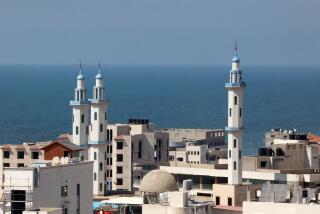God’s old neighborhood
- Share via
WHY is America so enmeshed in the Middle East? Our strategic support for Israel, for example, is usually explained as an alliance with the only democracy in the region. The war in Iraq has been variously presented as a preemptive strike on Saddam Hussein’s stockpile of weapons of mass destruction, the opening of a new front in the global war against terrorism and a strategic campaign to secure America’s supply of oil from the Middle East. Seldom mentioned is the fact that all of these geopolitical struggles are being carried out in places that we first read about in the family Bible.
“The Cradle of Civilization -- the tiny, fertile crescent of land that stretches from Mesopotamia to North Africa [has] once more seized control of the world’s destiny, and the future of civilization seemed to be at stake,” writes Bruce Feiler in “Where God Was Born,” his latest exercise in hot-wiring the ancient biblical texts to facts on the ground in the Middle East. “The collision of politics, geography and faith has dominated nearly every story in the Middle East since the birth of writing -- from the epic of Gilgamesh to the fatwas of Ayatollah Khomeini.”
Feiler’s new book is an account of his recent travels, Bible in hand, through Israel and Iraq with a short side trip to Iran. While in Israel, he ponders the biblical account of the Exodus, the conquest of the Promised Land, the kingdom of David and the glories of Solomon’s Temple. And his sojourn in the war zone of Iraq, site of biblical Babylon, allows him to conjure up the Garden of Eden, the Tower of Babel and the Babylonian Exile, among other familiar biblical motifs. “[T]he first war in Iraq,” he observes, “was between Cain and Abel.”
Iran is something of a stretch from the perspective of the Bible. “Closer to India than to Israel,” he writes, “Iran is part of a different ecosystem than much of the Middle East and a different cultural tradition as well.” But he points out that an ancient Persian emperor, Cyrus, is honored among “God’s anointed” -- that is, a messiah -- in the Bible because he put an end to the Babylonian Exile and sanctioned the construction of the Second Temple. “No group benefited more from Cyrus’s magnanimity than the Jews,” writes Feiler, “and no document heralds his greatness more than the Bible.”
Feiler, author of the bestselling “Walking the Bible” and “Abraham,” is hardly the first to tread these paths. Mark Twain’s “The Innocents Abroad,” Karen Armstrong’s “Jerusalem: One City, Three Faiths” and other books have surveyed the same territory, often with more edge and authority.
But Feiler (who briefly references my work in this book) has established a kind of franchise in contemporary biblical travelogue, mastering a formula that blends armchair adventure, pop archeology and spiritual uplift. (Also recently published is Feiler’s “Walking the Bible: A Photographic Journey” [William Morrow: 162 pp., $32.50], which reproduces dozens of photographs he and others have taken of places mentioned in the Bible and other landscapes of the Middle East.)
Feiler tends to dramatize his own experiences. Thus, for example, an excursion by helicopter above the land of Israel is rendered as a moment of crisis and then revelation: “I feel as if I’m in a full-body migraine,” writes Feiler. “And then, just as suddenly, quiet. The sound dissolves, my body relaxes. I’m in the air, in a war. I’m at peace,” he continues, referring to the armed conflict between Israel and its Palestinian-Arab adversaries. Indeed, “Where God Was Born” is essentially a confessional work.
“For years I ran decisions through the part of me rooted in my hometown in Georgia and the part grounded in my Ivy League education. Now I also ran them through the Bible and the lens of meaning provided by the ancient stories,” he writes. “The Bible, which for so long had seemed the refuge of the past, suddenly seemed the most vital route for making sense of the tumult of the hour.”
To his credit, Feiler concedes that the Bible he carries and consults throughout his travels across the Middle East is not a book of history in the modern sense. “After two centuries of aggressive digging, archeologists have come to what can be characterized as an awkward accommodation with the Hebrew Bible,” he notes. “For the Torah, there is simply no physical evidence that any of the events described took place.”
Nor does Feiler shrink from the harsh theological implications of violence in the name of God. “There is one God, and God controls the world,” insists a Hasidic Jew in the aftermath of a terrorist suicide bombing in Jerusalem. “God controls the bomb, and the bomber.” In fact, Feiler, who is Jewish, experiences a soul-shaking spiritual crisis after visiting the Jewish homeland, and he ends up distancing himself from the Bible: “I was learning that I could no longer rely on the once familiar pillars of my religious identity: King David, the Temple, the Western Wall. I had to find my own route to God.”
But Feiler is always looking for points of connection and reconciliation among Jews, Christians and Muslims, all of whom share a scriptural tradition that seems only to sharpen the conflicts among them. He acknowledges that King David is depicted in the Bible as a bloodthirsty warrior and conqueror, but he also reminds his readers of the linkage between David and Jesus: “The interfaith roots of David run deep in this soil.” He shows us the contents of the field kit issued to chaplains who accompany U.S. troops into battle: “a crucifix, a screw-together chalice, communion wine and wafers, a rosary, a kippah [Jewish head covering], teffilin (Jewish prayer boxes), and Muslim prayer beads.”
For Feiler, the contrast between the Promised Land and the Babylonian Exile is especially instructive, and he explicitly defends the Diaspora as a crucial element of Jewish identity. Indeed, he seems to suggest that “Holy” and “Land” ought to be decoupled. “The surprising lesson of the Exile is that God does not abandon us in moments of despair, nor does he save us,” affirms Feiler. “Only we can save ourselves from exile. By the rivers of Babylon, we should not weep for Zion. We should not seek vengeance on our enemies. We should redeem ourselves.”
Few observers of the modern Middle East, of course, can avoid a sense of despair nowadays. “When you and I first started traveling years ago, we were in the bubble of peace,” says Avner Goren, the Israeli archeologist who served as Feiler’s guide and guru in “Walking the Bible.” “But there is a lot of sadness now -- and big questions.” Significantly, the same sentiment is echoed by Yusef Natsheh, an Arab resident of Jerusalem: “It really makes me feel that hope is so far [away] for any of us.”
Still, Feiler aspires to bring “Where God Was Born” to an upbeat ending. “One gift of my journey was discovering that the Hebrew Bible tells a more subtle story of the origins of monotheism than I had been led to expect,” he concludes. “The first conviction I took from my journey is that the only force strong enough to take on religious extremism is religious moderation.”
The encounters and conversations that Feiler describes in detail in “Where God Was Born” help explain why he insists, against all current evidence, that religion can be a bridge rather than a barrier. After all, none of the men and women he meets on his travels -- archeologists and generals, irrigation engineers and emergency room physicians, army chaplains and movie producers -- are religious fanatics. But even if they are unseen and unheard here, it is suicide bombers who haunt the pages of his book, just as they stalk the landscape of the Middle East. *
More to Read
Sign up for our Book Club newsletter
Get the latest news, events and more from the Los Angeles Times Book Club, and help us get L.A. reading and talking.
You may occasionally receive promotional content from the Los Angeles Times.










